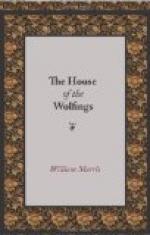“Thou art wise,” she said; “Wilt thou go to battle to-day?”
“So it seemeth,” said he.
She said: “And wilt thou bear the Dwarf-wrought Hauberk? for if thou dost, thou wilt live, and if thou dost not, thou wilt die.”
“I will bear it,” said he, “that I may live to love thee.”
“Thinkest thou that any evil goes with it?” said she.
There came into his face a flash of his ancient boldness as he answered: “So it seemed to me yesterday, when I fought clad in it the first time; and I fell unsmitten on the meadow, and was shamed, and would have slain myself but for thee. And yet it is not so that any evil goes with it; for thou thyself didst say that past night that there was no evil weird in it.”
She said: “How then if I lied that night?”
Said he; “It is the wont of the Gods to lie, and be unashamed, and men-folk must bear with it.”
“Ah! how wise thou art!” she said; and was silent for a while, and drew away from him a little, and clasped her hands together and wrung them for grief and anger. Then she grew calm again, and said:
“Wouldest thou die at my bidding?”
“Yea,” said he, “not because thou art of the Gods, but because thou hast become a woman to me, and I love thee.”
Then was she silent some while, and at last she said, “Thiodolf, wilt thou do off the Hauberk if I bid thee?”
“Yea, yea,” said he, “and let us depart from the Wolfings, and their strife, for they need us not.”
She was silent once more for a longer while still, and at last she said in a cold voice; “Thiodolf, I bid thee arise, and put off the Hauberk from thee.”
He looked at her wondering, not at her words, but at the voice wherewith she spake them; but he arose from the stone nevertheless, and stood stark in the moonlight; he set his hand to the collar of the war-coat, and undid its clasps, which were of gold and blue stones, and presently he did the coat from off him and let it slide to the ground where it lay in a little grey heap that looked but a handful. Then he sat down on the stone again, and took her hand and kissed her and caressed her fondly, and she him again, and they spake no word for a while: but at the last he spake in measure and rhyme in a low voice, but so sweet and clear that it might have been heard far in the hush of the last hour of the night:
“Dear now are this dawn-dusk’s
moments as is the last of the light
When the foemen’s ranks are
wavering, and the victory feareth night;
And of all the time I have loved
thee of these am I most fain,
When I know not what shall betide
me, nor what shall be my gain.
But dear as they are, they are waning,
and at last the time is come
When no more shall I behold thee
till I wend to Odin’s Home.
Now is the time so little that once
hath been so long
That I fain would ask thee pardon
wherein I have done thee wrong,
That thy longing might be softer,
and thy love more sweet to have.
But in nothing have I wronged thee,
there is nought that I may crave.
Strange too! as the minutes fail
me, so do my speech-words fail,
Yet strong is the joy within me
for this hour that crowns the tale.”




